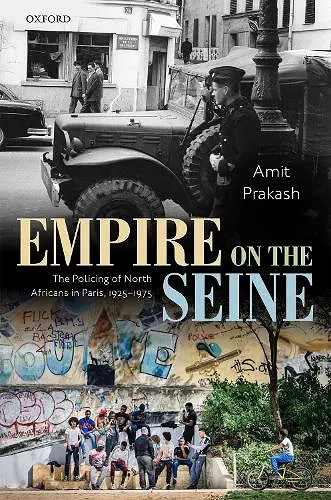Empire on the Seine
The Policing of North Africans in Paris, 1925-1975
Format:Hardback
Publisher:Oxford University Press
Published:15th Mar '22
Currently unavailable, and unfortunately no date known when it will be back

Why are relations between minorities and the police in France so fraught? Stripping away the myth that this tension is a sudden and recent disruption of its universalist republican tradition brought on by the presence of North African immigrants, Amit Prakash locates the origins of contemporary conflicts in race and empire in France's history. In Empire on the Seine, Prakash argues that the métropole and the colony dynamically co-developed a policing regime over the course of the nineteenth and twentieth centuries to manage colonial and racial difference. With the North African community emerging as a sizable and durable presence in Paris after World War I, this policing became a key state practice in imagining and administering the immigrant population. Prakash shows that despite the French state's current reluctance to use race as an official category, racial thought and racial targets animated police services, social services, and urban planning schemes from the 1920s until the 1970s. Using police archival records, reports from colonial officials, urban planning and housing studies, and the records of French social workers and immigrant associations, Prakash shows that colonial racism was integrated into the policing of Paris and that architecture, urbanism, and social housing assumed police functions for colonial and postcolonial migrants. In light of this history, contemporary social and racial segregation, periodic protests and rioting against police violence, and the aggressive posture of the Parisian police emerge as the material traces of French colonialism in the métropole. The city of Paris was the capital of an empire and its imperial shadows are long.
In this wonderful, wide-ranging book, Amit Prakash uncovers the many layers of French anxiety over North African immigration. With great theoretical sophistication and thorough archival detective work, he takes the reader through police efforts to come to terms with, to understand, a process that consistently baffled them, to make North African immigration to Paris comprehensible and, ultimately, manageable. While their efforts famously failed, they laid the foundation for durable patterns of discrimination and inequality that remain of urgent concern. * Clifford Rosenberg, The City College of New York and Graduate Center, CUNY *
Empire on the Seine is a lucidly written and incisive study of how, from the 1920 through the 1970s, police in Paris fixated on 'North African' inhabitants, a racialized surveillance that also shaped urban space. Prakash's innovative and interdisciplinary approach to spatiality bridges histories of empire and of the city and will prove useful to scholars in many fields. At the same time, the book's extended chronology and deep archival anchorreveal the blind-spots of existing work on the French police and Algerians that more circumscribed chronologies—notably around the Algerian War andOctober 17, 1961—encourage. * Todd Shepard, Johns Hopkins University *
The book...brings[s] important new insights to the study of policing minorities in Paris and would be of interest to students and scholars of the French Empire, Paris, and (post)colonial policing. Pushing forward conversations about the scope and face of the police, Empire on the Seine invites scholars to rethink mechanisms of state power and state violence. * Danielle Beaujon, University of Illinois at Chicago *
[W]hat makes Prakash's treatment so valuable is the skill with which he untangles the trans-Mediterranean colonial connections, the political controversies, and the vicious French police practices that made it so. * Prof. Martin Thomas, University of Exeter, The English Historical Review *
Empire on the Seine is a well-written and welcome addition to the growing scholarship on colonial migration and police surveillance in France and the French Empire...Prakash's book succeeds in positioning Paris as an imperial capital, but it also moves back and forth from metropole to colony when needed, showing how the two were deeply intertwined in terms of ideas, policy, and actions. Empire on the Seine succeeds in showing that the violence of colonialism, from the earliest conquest to the wars of independence, constantly intruded on the metropole. * Kathleen Keller, The American Historical Review *
Well-written and superbly researched account of the long-term history of French policing of racialized minorities and its imperialpedigree. Students interested in the metropolitan repercussions of the French Empirewould be well advised to read it carefully. * Michael Goebel, Journal of Modern History *
[A] well-written and superbly researched account of the long-term history of French policing of racialized minorities and its imperial pedigree. Students interested in the metropolitan repercussions of the French Empire would be well advised to read it carefully. * Michael Goebel, Journal of Modern History *
ISBN: 9780192898876
Dimensions: 240mm x 162mm x 21mm
Weight: 570g
282 pages